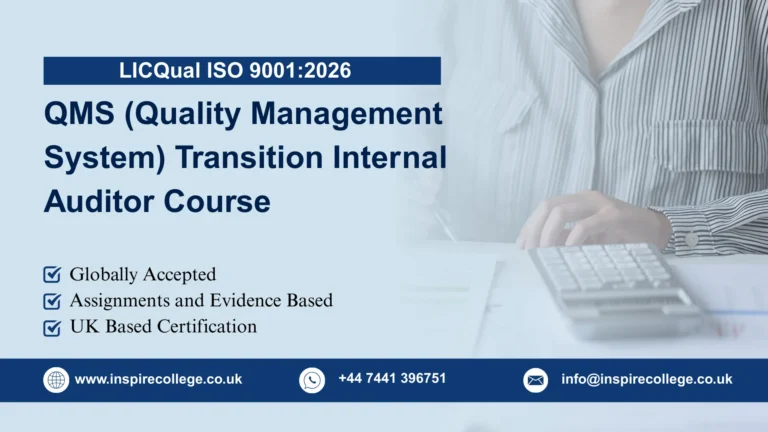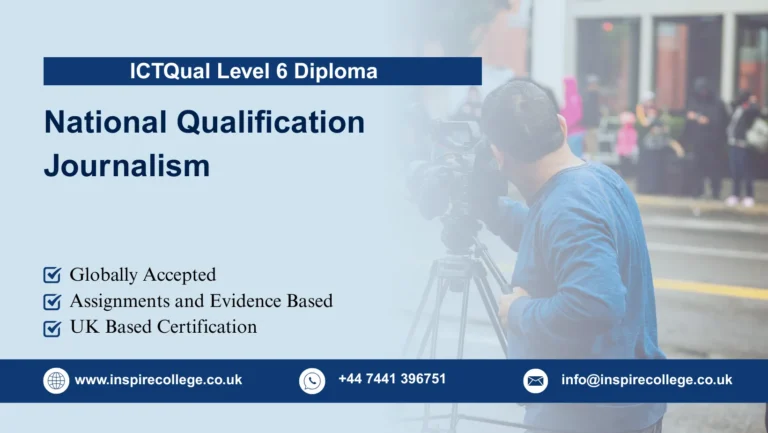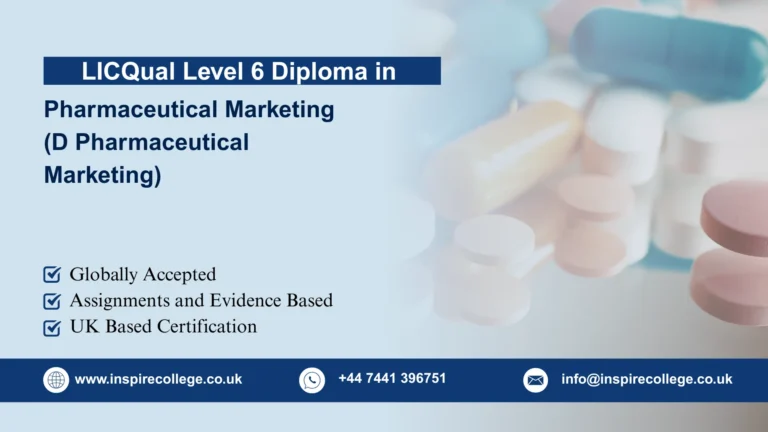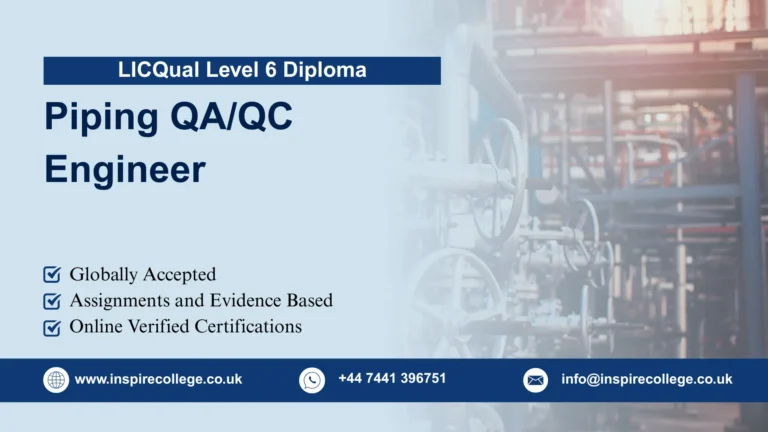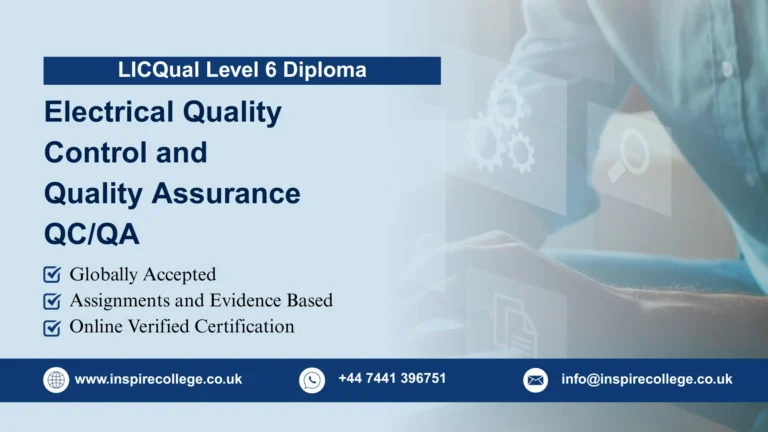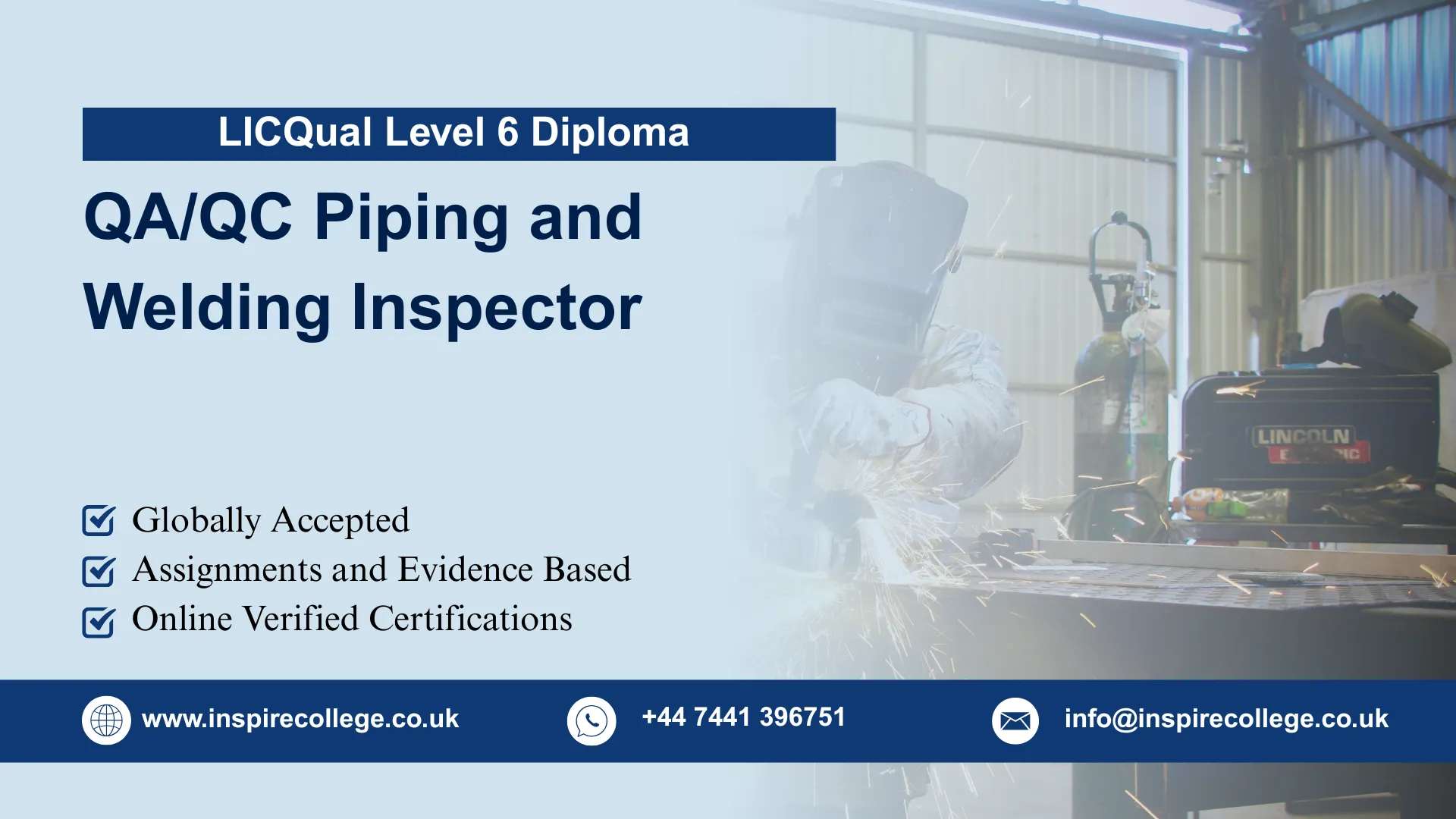
LICQual Level 6 Diploma in QA/QC Piping and Welding Inspector
The LICQual Level 6 Diploma in QA/QC Piping and Welding Inspector is a premier qualification designed to equip experienced professionals and aspiring leaders with advanced skills in quality assurance, quality control, and piping inspection. In today’s industrial landscape, maintaining the highest standards in piping and welding operations is crucial for ensuring safety, regulatory compliance, and operational efficiency across sectors such as oil & gas, petrochemicals, power generation, and construction. LICQual Level 6 Diploma in QA/QC Piping and Welding Inspector provides an in-depth understanding of these critical processes, preparing learners to excel in senior technical and supervisory roles.
The purpose of LICQual Level 6 Diploma in QA/QC Piping and Welding Inspector is to develop expertise in both theoretical principles and practical applications of QA/QC inspection. Learners will gain advanced knowledge in international codes and standards, welding procedures, non-destructive testing (NDT) techniques, and inspection planning. LICQual Level 6 Diploma in QA/QC Piping and Welding Inspector emphasizes risk-based quality management, project documentation, and compliance auditing, ensuring that graduates can evaluate, monitor, and improve piping and welding systems to meet stringent industrial requirements.
Throughout the program, learners will engage in hands-on activities and case studies, enabling them to apply inspection methods, assess weld integrity, and implement corrective actions effectively. They will develop competencies in preparing inspection test plans, maintaining quality records, and managing QA/QC teams, which are essential for leadership and project management in industrial environments.
This comprehensive diploma not only equips learners with advanced technical expertise but also emphasizes practical, hands-on applications in real-world engineering projects. Participants will develop proficiency in inspection planning, welding evaluation, NDT techniques, and compliance with international codes and standards. The program fosters critical thinking, problem-solving, and leadership skills, preparing professionals to manage QA/QC teams, oversee complex piping and welding operations, and ensure project integrity across high-stakes industries such as oil & gas, petrochemical, energy, and infrastructure development.
By completing the LICQual Level 6 Diploma in QA/QC Piping and Welding Inspector, professionals will not only enhance their technical proficiency but also gain globally recognized credentials, increasing their employability and career advancement opportunities in international projects. LICQual Level 6 Diploma in QA/QC Piping and Welding Inspector is ideal for QA/QC engineers, piping and welding inspectors, project managers, and technical supervisors aiming to achieve excellence in quality assurance and control within industrial and engineering sectors.
- Age Requirement
- Applicants must be at least 21 years old at the time of enrollment.
- This ensures that learners possess the necessary maturity, professional judgment, and readiness to engage with advanced technical, managerial, and safety aspects of QA/QC and piping inspection roles.
- A minimum age criterion helps candidates approach complex practical exercises and real-world project scenarios with responsibility and focus.
- Educational Requirements
- Candidates should hold a Level 4 or Level 5 qualification in disciplines such as Mechanical Engineering, Civil Engineering, Industrial Technology, or closely related technical fields.
- Alternatively, applicants with a Bachelor’s degree (or equivalent) in Engineering, Technology, or a similar field are preferred.
- Individuals without a formal degree but with substantial hands-on experience in QA/QC, piping, welding, or inspection roles may also be considered on a case-by-case basis.
- This ensures that learners have the foundational technical knowledge needed to understand complex QA/QC principles, piping systems, fabrication methods, and industrial standards.
- Professional Experience
- A minimum of 2–3 years of relevant experience is strongly recommended for successful course engagement.
- Ideal experience includes roles in QA/QC, piping inspection, welding supervision, fabrication oversight, or engineering project management.
- Candidates with practical exposure to welding inspection, non-destructive testing (NDT), or quality assurance in industrial or construction projects are highly suitable.
- Practical experience allows learners to relate theoretical concepts to real-world scenarios, enhancing their ability to apply advanced QA/QC techniques effectively.
- English Language Proficiency
- Applicants must demonstrate a strong command of English, including reading, writing, and comprehension skills.
- Proficiency is necessary for understanding technical documentation, interpreting project specifications, completing assessments, and communicating findings effectively with project teams.
- English competency ensures learners can follow detailed QA/QC procedures, maintain accurate reports, and participate fully in discussions and practical exercises.
- Overall Preparedness
- Meeting these entry criteria ensures that participants are well-equipped to fully benefit from the LICQual Level 6 Diploma in QA/QC Piping Inspector.
- The combination of age, educational background, practical experience, and language proficiency prepares learners to undertake advanced QA/QC tasks confidently.
- Graduates of the program will be ready to take on leadership roles in quality assurance, inspection, and project management across industrial, construction, and engineering sectors.
Mandatory Units
The LICQual Level 6 Diploma in QA/QC Piping and Welding Inspector, achieve the qualification candidates must achieve all of the mandatory units:
Mandatory Units
The LICQual Level 6 Diploma in QA/QC Piping and Welding Inspector is a comprehensive program designed to equip professionals with advanced skills in quality assurance, inspection, and compliance for piping and welding projects. This course focuses on international standards, risk-based inspection, and project quality management to prepare learners for senior-level engineering roles.
1. Advanced Principles of QA and QC in Engineering
Upon successful completion of this unit, learners will be able to:
- Explain the fundamental concepts and strategic importance of Quality Assurance (QA) and Quality Control (QC) within engineering projects.
- Develop and implement advanced QA/QC frameworks to enhance project quality and performance.
- Evaluate existing quality systems in accordance with ISO 9001 and other recognized quality management standards.
- Identify potential risks related to quality failures and implement effective mitigation strategies.
2. International Codes and Standards for Piping and Welding
Upon successful completion of this unit, learners will be able to:
- Interpret and apply key international codes and standards such as ASME, API, ISO, and AWS to ensure compliance in piping and welding operations.
- Assess compliance requirements for piping and welding procedures according to global regulatory norms.
- Ensure inspection and documentation procedures meet both client and regulatory standards.
- Differentiate between specifications for materials, fabrication, and testing in accordance with international standards.
3. Welding Metallurgy and Inspection Techniques
Upon successful completion of this unit, learners will be able to:
- Understand the metallurgical principles that affect weld quality and performance.
- Identify welding defects, determine their causes, and apply appropriate inspection techniques.
- Evaluate the influence of heat treatment and weld microstructure on mechanical properties.
- Apply materials science knowledge to resolve welding-related quality issues effectively.
4. Piping Systems Design, Fabrication, and Inspection
Upon successful completion of this unit, learners will be able to:
- Interpret piping design drawings, P&IDs, and isometric diagrams accurately.
- Analyze fabrication processes including cutting, bending, welding, and testing.
- Conduct inspections of piping systems in accordance with industry standards.
- Apply dimensional and visual inspection criteria to ensure the quality and integrity of fabricated piping systems.
5. Advanced NDT Methods and Applications
Upon successful completion of this unit, learners will be able to:
- Demonstrate proficiency in advanced NDT techniques, including RT, UT, MT, PT, and phased array ultrasonic testing.
- Select the most appropriate NDT method based on material type, defect characteristics, and inspection conditions.
- Evaluate and interpret NDT reports to support effective quality control decisions.
- Ensure that all NDT procedures comply with international safety and regulatory standards.
6. Project Quality Planning and Risk-Based Inspection (RBI)
Upon successful completion of this unit, learners will be able to:
- Develop comprehensive Project Quality Plans (PQP) including Inspection Test Plans (ITPs) and Quality Control Plans (QCPs).
- Apply risk-based inspection principles to prioritize critical inspection activities.
- Assess project risks and implement mitigation strategies aligned with quality objectives.
- Coordinate with multidisciplinary teams to implement and monitor effective quality planning tools throughout project execution.
The LICQual Level 6 Diploma in QA/QC Piping and Welding Inspector is ideal for professionals seeking advanced knowledge and leadership roles in quality assurance and control. This course is particularly suitable for:
Individuals seeking to acquire advanced competencies to lead QA/QC teams, manage comprehensive inspection protocols, and ensure the highest quality standards in complex engineering, piping, and welding projects.ment.
Experienced QA/QC professionals aiming to enhance their credentials and progress into senior-level or managerial positions.
Mechanical, piping, and welding engineers who want to specialize in inspection and quality control processes across industrial and engineering projects.
Welding inspectors and NDT technicians looking to broaden their qualifications and expand career opportunities.
Engineering project managers and site supervisors responsible for maintaining adherence to quality plans, codes, and specifications.
Technical diploma or degree holders in mechanical, petroleum, or industrial engineering aspiring to work in high-demand sectors such as oil & gas, power generation, or large-scale construction projects.
Professionals employed in fabrication yards, EPC companies, or inspection agencies seeking globally recognized credentials.
Register Now
FAQs for LICQual Level 6 Diploma in QA/QC Piping and Welding Inspector

